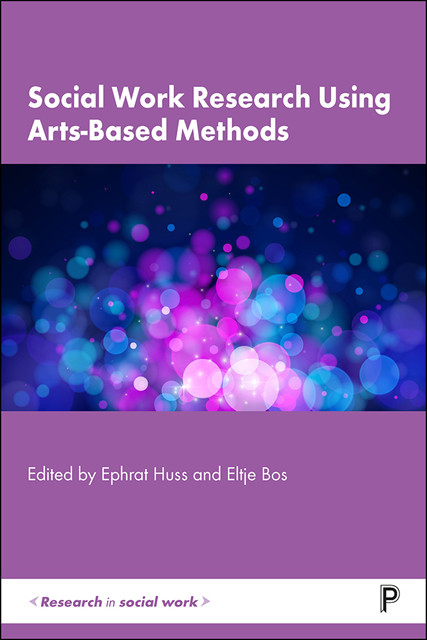Book contents
- Frontmatter
- Dedication
- Contents
- List of figures and tables
- Notes on contributors
- Introduction
- Section I Arts-based research as a method to understand and give voice to marginalised groups
- Section II Using arts-based research to listen to, and give voice to, children in social work
- Section III Arts-based research as a way for researchers and community members to understand communities
- Epilogue
- Index
16 - Art as a way of improving participatory action research: an experience with youngsters with an intellectual disability and their families
Published online by Cambridge University Press: 13 October 2022
- Frontmatter
- Dedication
- Contents
- List of figures and tables
- Notes on contributors
- Introduction
- Section I Arts-based research as a method to understand and give voice to marginalised groups
- Section II Using arts-based research to listen to, and give voice to, children in social work
- Section III Arts-based research as a way for researchers and community members to understand communities
- Epilogue
- Index
Summary
This chapter describes the use of different artistic expression strategies in a participatory action research process. The protagonists of this project are young people with intellectual disabilities and their families in the context of a socio-occupational training programme at the university.
The main objective of the research is to explore themes around the overprotection– autonomy continuum from the participants’ perspectives. A set of artistic techniques from different disciplines (visual art, performing art, and music) were used as a means to discuss and define the terms and their implications. Critically, this was in a participatory manner. At the beginning, the young people and their parents worked separately and independently following the same research steps and performing similar activities. The process and the methodology created opportunities to bridge the gap and increase mutual understanding that would not be possible through the daily interactions of normal life.
Concrete examples are presented that highlight the benefits and difficulties of introducing activities not commonly found in a university environment. The analysis also includes a critical reflection about the possible use of art techniques in participatory action research projects with people with intellectual disabilities.
Introduction
Throughout history, people with intellectual disabilities have faced many socio-cultural barriers that have placed them in a position of inferiority in relation to the rest of society (Corrigan, 2014). The most common life plan for human beings is to achieve an adequate standard of living, have good relationships, have the freedom to make decisions based on personal convictions, and participate actively in family and community life. These aims are often unattainable dreams for people with disabilities (Abbott & McConkey, 2006). Despite the unquestionable progress in the conceptualisation and social recognition of the group (Roth et al., 2019), its social position and role clearly limit the possibility of living a full life. This fact is connected to access to education. People with disabilities experience great difficulties in finding supportive and inclusive spaces to eliminate the stigmas that promote exclusion (Madaus, 2011).
This research is part of the Univerdi programme, a University of Jaen certificate, managed and run by university lecturers. Its main objective is the social and professional training of people with intellectual disabilities.
The staff responsible for the programme asked the authors, who are specialised in group work research and intervention, to intervene in what appeared to be a case of ‘bullying’ among the participants.
- Type
- Chapter
- Information
- Social Work Research Using Arts-Based Methods , pp. 181 - 197Publisher: Bristol University PressPrint publication year: 2022

